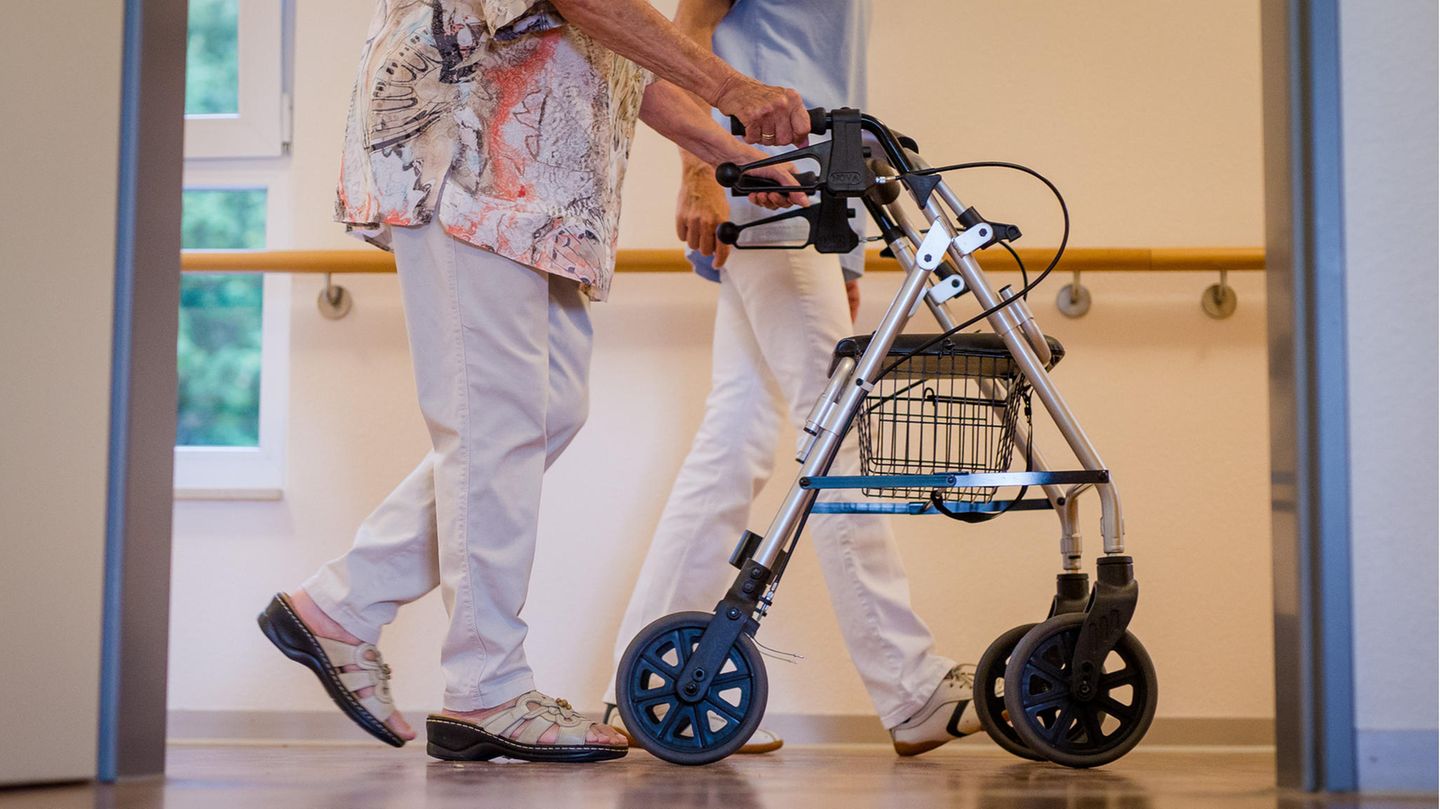During the first lockdown at the start of the pandemic, the elderly were lonely in medical facilities. Visitors later brought in the virus and many residents died. Even now they are at risk – despite the vaccination.
“That’s exactly what we didn’t want to experience again.” Brandenburg’s Minister of Health Ursula Nonnemacher (Greens) recently commented on a corona outbreak in a nursing home with a dozen dead. Phrases like these are common when speaking to scientists, health professionals, and other professionals about the virus problem in retirement and nursing homes. Because in the pandemic it has long been shown that the virus hits particularly elderly, previously ill people with full force, that it is particularly fatal for them.
For many observers, the outbreaks currently being reported are therefore a bad déjà vu. You can also hear anger: about mistakes that happened again and again and which some believe will continue to happen. Politicians are alarmed by the recent cases, the debate is about testing and vaccination requirements. The federal and state health ministers have just decided to expand the mandatory testing in old people’s and nursing homes. Accordingly, vaccinated or recovered visitors to homes should also be obliged to take tests, but these should be free of charge. An analysis of critical points and blind spots.
Current development and role of vaccination
According to the Robert Koch Institute (RKI), outbreaks are increasing again in old people’s and nursing homes. The RKI recorded 1264 corona cases in this context for the week until October 31. According to the current weekly report, the balance since the start of the pandemic: 6594 outbreaks, more than 160,000 infected people, almost 24,000 deaths. However, a graphic in the RKI weekly report shows that the majority of the infections happened at the end of 2020 and beginning of 2021 – in comparison, a much flatter curve has recently been shown. Subsequent transmissions for the past few weeks could change this picture.
“The vaccination works, we have fewer cases than last year. It saves many old people from premature death,” said the medical officer of Berlin-Reinickendorf, Patrick Larscheid. In almost every district of the capital, there are currently outbreaks in nursing care, but in contrast to autumn and winter 2020, many who tested positive did not fall ill at all. Despite the deaths in outbreaks, it must be clear that the numbers would be even higher without vaccination and that the vaccination status of the dead is not always known. The chairman of the Standing Vaccination Commission, Thomas Mertens, said a few days ago that it is not possible to know for sure whether every person who has been vaccinated twice is really protected, and that the vaccination does not work the same for everyone.
Vaccine picking also among those in need of care
According to experts, it is a mistake to think that all home residents have long been vaccinated. There is some fluctuation there. Many come to the home unvaccinated, said Larscheid. “They previously needed care at home, where no one vaccinated them.” Some also report cases in which the residents’ children are against it.
With high case numbers, it becomes more likely that the virus will also be introduced into homes. There is also the much more contagious Delta variant. On request, the RKI announced: Infection protection and vaccinations in the facilities could have successfully prevented cases, but outbreaks occur if the incidence is high in the population. A main reason for the increase in outbreaks cannot currently be deduced.
For Eugen Brysch, chairman of the Patient Protection Foundation, the focus is on several particularly endangered groups: 900,000 residents of geriatric care facilities, but also around a million people who are cared for by outpatient services, as well as around 200,000 people in assisted living. “We have the tools to get through the crisis,” he said, referring to vaccinations, tests, protective materials and knowledge of the spread of the virus. “But these are not being used sufficiently.” There is also a lack of meaningful data on important aspects, so that there is no clear picture of the situation. “This toxic mixture means that the overall high incidence in the population has an almost unchecked effect on the very old.”
The immunity is decreasing – booster vaccination is necessary
For the specialist in microbiology, virology and infection epidemiology, Jana Schroeder, declining immunity after two vaccinations is the main reason for the increase in the number of outbreaks. “It is becoming more and more apparent that a complete vaccination schedule against corona, especially for the elderly, consists of three doses.” In this way, high levels of antibodies could be achieved. But experts also make it clear that even with third spades in all probability not every death can be prevented – after all, it is about very old people, mostly with previous illnesses.
How many nursing home residents already have the third syringe? There was no information available, it said at the RKI. The statistics only show that the booster vaccination rate for people over 60 fluctuates very strongly depending on the federal state and has so far mostly been in the single-digit percentage range. A total of 2.5 million booster vaccinations have been recorded in Germany so far. These have also been running for some time with hospital staff, for example.
A vaccinated environmentis considered to be particularly important for better protection of vulnerable groups. Several experts and associations recently called on employees with contact to sick people and those in need of care to be vaccinated. So far, the vaccination rates for nursing staff have apparently fluctuated greatly depending on the facility. Some of the values give cause for concern, said the President of the National Association of Statutory Health Insurance Physicians, Andreas Gassen, recently in Berlin. To stay with the example from Brandenburg: Only about every second nurse is said to have been vaccinated against Corona there. An expert reports of “giant houses” with vaccination rates of a third among the nursing staff – but no official confirmation is available.
Very frequent – and thus annoying at some point – testing could, from the point of view of some experts, encourage willingness to be vaccinated. “In our four elderly care facilities, the staff vaccination rate is well over 90 percent, we have not had any corona deaths in the entire pandemic – and it should stay that way,” said Schroeder, who, in addition to the hospitals of the Mathias Hospital Rheine, also works for these bodies is responsible. Unvaccinated staff had to do a quick test every day before going on duty. Institutions that let low vaccination rates get away cut themselves into their own flesh. Schroeder’s personal experience: offers to talk to unvaccinated people are not well received.
Strict house rules
When cases became known, institutions sometimes imposed visiting bans as a first step – this served the narrative that the visitors were the problem, criticized medical officer Larscheid. But that’s not true. The danger does not come from outside, but from inside: picking vaccines is the biggest problem and affects nursing assistants rather than specialist staff.
In the meantime, calls for the broadest possible testing have become loud: According to Brysch, daily rapid tests would be necessary for residents, employees and visitors – including those who have been vaccinated, who could also transmit the virus, in order to get the particularly vulnerable people safely through the winter. “We need a test obligation for all people who set foot over the threshold of a nursing home or a hospital”, formulated the president of the social association VdK, Verena Bentele.
The socially controversial topic is a political decision, emphasize many scientists. There are voices who fear that duty could polarize even more and induce more caregivers to flee their jobs. On the matter, he thinks the step taken by countries like Italy is the right one, says Larscheid. People in care facilities are dependent on the caregivers and depend on not being unnecessarily endangered.
The personnel requirements in old people’s and nursing homes and the professional competence in hygiene and infection protection seemed “not always to be sufficient to be able to fully implement the recommendations,” said the RKI. An expert describes the behavior of the facility manager in Brandenburg as “scandalous”: A fine procedure was initiated against him because he had re-entered the home after a positive test result.
Source From: Stern




